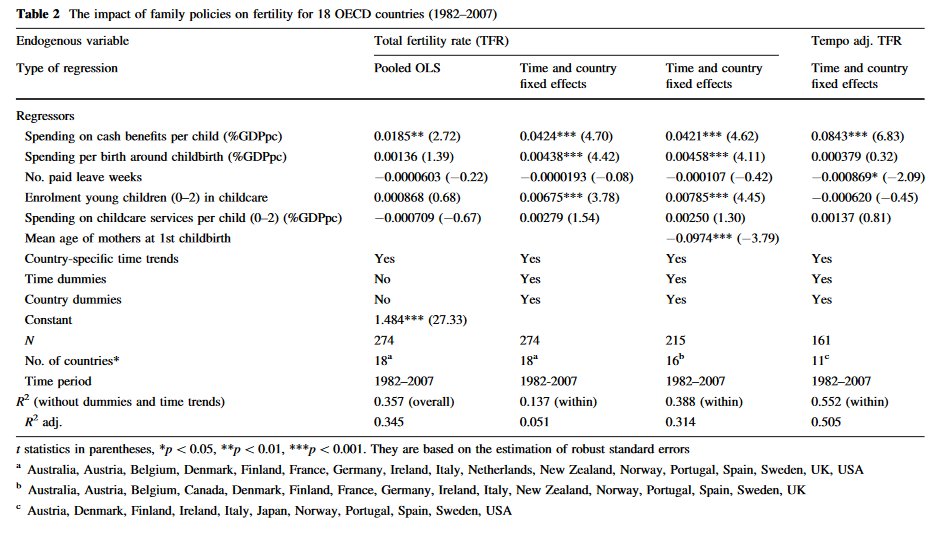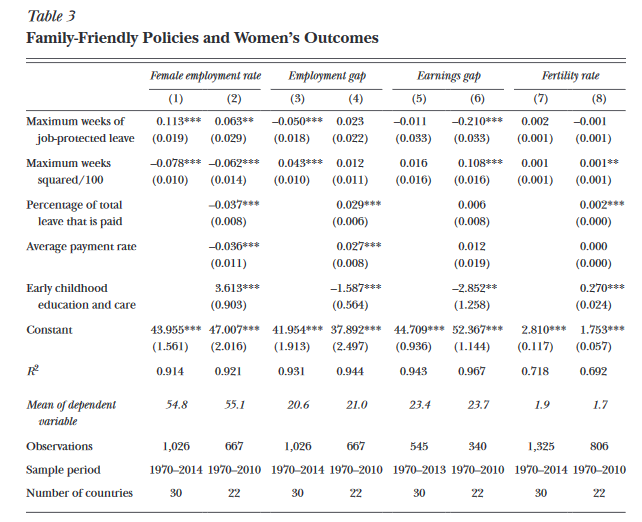This piece by @clairecm includes an uncited false statement about the research on pronatalism. It flatly contradicts the existing research by claiming that childcare subsidies boost fertility more than child allowances. https://www.nytimes.com/2021/02/17/upshot/americans-fertility-babies.html
The false statement occurs in the opening lines of the piece, and again later on in more detail. It's a key argument.
Gallingly, it even cites my own research on this, despite the fact that my lit review ***literally showed the opposite***.
Gallingly, it even cites my own research on this, despite the fact that my lit review ***literally showed the opposite***.
I am aware of 3 studies explicitly assessing effect of childcare on fertility: Lee and Lee (2014) using local variation in Japan; Rindfuss, Guilkey, Morgan, and Kravdal (2010) using a 1973 expansion in Norway; and the ever-popular OECD panel of Luci-Greulich and Thevenon (2013)
Of those three, the Japan case found NO EFFECT.
The Norwegian case found an elasticity of 0.22-0.3 (% change in fertility / program spending as % of GDP ).
The OECD panel study found an elasticity of -0.001 to 0.004/
The Norwegian case found an elasticity of 0.22-0.3 (% change in fertility / program spending as % of GDP ).
The OECD panel study found an elasticity of -0.001 to 0.004/
Neither the Japanese nor Norwegian case studies analyzed the effect of childcare subsidies IN COMPARISON TO other policies.
However, the OECD panel study did do so.
However, the OECD panel study did do so.
Of the three studies, the OECD panel has 256 cites, the Norway case has 2003, and the Japanese case has 59, so none of these are obscure papers, and the OECD one is the most recent and the most comprehensive.
Here is the table of their results.
Big significant effects for child allowances!
Small significant effects for baby bonuses!
NEGATIVE effects of paid leave!
Positive effect of daycare *enrollment*, but zero effect of daycare *spending*.
Big significant effects for child allowances!
Small significant effects for baby bonuses!
NEGATIVE effects of paid leave!
Positive effect of daycare *enrollment*, but zero effect of daycare *spending*.
If we want to know about "lasting" fertility effects which @clairecm talks about we should look at the TEMPO ADJUSTED column.
And there we see NO EFFECT of childcare on fertility.
And there we see NO EFFECT of childcare on fertility.
Now, when they add in controls for womens' labor force participation, childcare turns positive, but the effect is still WAY smaller than childcare allowances. But this is also kind of a weird control: one way daycare/allowances alter fertility *is by altering work behavior*.
My stats methods junkies will understand why I'm saying when I say that EVEN THEIR 2SLS MODEL could not turn up significant effects of subsidizing childcare on fertility!
y'all
you can make IV regressions say almost anything! but it couldn't say that!
y'all
you can make IV regressions say almost anything! but it couldn't say that!
Here's hoping that @UpshotNYT runs a correction of the incorrect statements about academic research made in this article by @clairecm https://www.nytimes.com/2021/02/17/upshot/americans-fertility-babies.html
Anyways, whichever of the researchers cited told @clairecm that childcare subsidies have bigger effects should go email her and correct that statement, because it's clearly false. (cc @familyunequal @KiaraDouds @SarahKCowan y'all are the ones mentioned)
Oh and I forgot two studies! Both from NBER so on a different part of my catalog.
First:
Kleven at al (2020) at NBER: https://www.nber.org/papers/w28082
It's about inequality, but they incidentally calculate fertility effects of an Austrian childcare expansion.
They found no effect.
First:
Kleven at al (2020) at NBER: https://www.nber.org/papers/w28082
It's about inequality, but they incidentally calculate fertility effects of an Austrian childcare expansion.
They found no effect.
Then there's this paper (sorry, not NBER; SSRN; working paper version is what I've read, now I think it's published in a final version somewhere): https://papers.ssrn.com/sol3/papers.cfm?abstract_id=2439616
It finds a significant positive effect.
It finds a significant positive effect.
So we have 5 papers.
2 find a positive effect.
2 find no effect.
1 finds mixed effects.
NONE of them find a bigger effect for childcare than for child allowances. cc @clairecm
2 find a positive effect.
2 find no effect.
1 finds mixed effects.
NONE of them find a bigger effect for childcare than for child allowances. cc @clairecm
By the way, that last paper is a study of local-area variation in childcare subsidies and takeup in German localities. It's a very neat paper and I like it. But there should be a little caution in interpreting it, as their control group *did* get treated, just a bit less.
The issue with this is that participation in childcare is, of course, voluntary, and the treated and treatment groups already had different TFRs, and so it's possible that the difference is arising from unobserved differences in pent-up-demand rather than the treatment itself.
This isn't a huge critique, but the point is that while it is totally supportable from the literature to say that "subsidizing childcare increases fertility," there is *no* evidence for @clairecm 's actual claim, which is that doing so increases fertility *more than* cash.
I mean point blank, it's kind of absurd to say that giving every family a $4,000 childcare voucher will increase fertility by more than giving every family a $4,000 check, since many families won't use that voucher.
There are of course supply constraints on childcare.... but places with subsidized childcare often have as severe or worse supply constraints!
And since there's very little in the way of proposals to roll out a national federal daycare program (and there never will be one), we have to realize the way any childcare program would actually work is a state/local publics, and subsidies for private.
Capacity issues will bedevil that program just as much, and overhead will be higher.
Okay so @clairecm in replies offered two more citations.
This one compares *parental leave* to *childcare*. She says this supports her claim.
It doesn't. I agree childcare may be better than (some forms of) parental leave! https://www.aeaweb.org/articles?id=10.1257/jep.31.1.205
This one compares *parental leave* to *childcare*. She says this supports her claim.
It doesn't. I agree childcare may be better than (some forms of) parental leave! https://www.aeaweb.org/articles?id=10.1257/jep.31.1.205
This paper ***does not show*** that childcare > child allowances.
it shows that childcare > (some kinds of) paid leave. Here's their table. They find no significant effect of paid leave, but do find that increase childcare boosts fertility.
it shows that childcare > (some kinds of) paid leave. Here's their table. They find no significant effect of paid leave, but do find that increase childcare boosts fertility.
Again, my argument here is not not that child care *does not* boost fertility.
It's that the evidence it does so *more than equivalent cash allowances* is just not there.
It's that the evidence it does so *more than equivalent cash allowances* is just not there.
Next this paper by folks at the Wittenberg Institute. Great place, love their work, big fan!
The authors do argue that childcare is "indispensable" to sustaining high TFR, while the effects of family allowances are "moderate" and "short term." https://www.unfpa.org/sites/default/files/pub-pdf/Policy_responses_low_fertility_UNFPA_WP_Final_corrections_7Feb2020_CLEAN.pdf
The authors do argue that childcare is "indispensable" to sustaining high TFR, while the effects of family allowances are "moderate" and "short term." https://www.unfpa.org/sites/default/files/pub-pdf/Policy_responses_low_fertility_UNFPA_WP_Final_corrections_7Feb2020_CLEAN.pdf
But the basis of that claim is not that there's an actual empirical study here.
This is not a meta-analysis of studies of the effects of family policy. Nor is it doing original empirical research. It's a very long lit review.
This is not a meta-analysis of studies of the effects of family policy. Nor is it doing original empirical research. It's a very long lit review.
It's a lit review by three very good and respected demographers!
But citing their non-quantitative description of their summary of the incomplete set of studies they included when *actual empirical studies of the question* yielded contradictory results is peculiar.
But citing their non-quantitative description of their summary of the incomplete set of studies they included when *actual empirical studies of the question* yielded contradictory results is peculiar.
Like, we actually have a study directly comparing the effects of cash spending vs. childcare spending. And it contradicted @clairecm 's claims. Nor do the Wittenberg authors trash that study: they cite it favorably (but don't mention its comparative findings)!

 Read on Twitter
Read on Twitter



